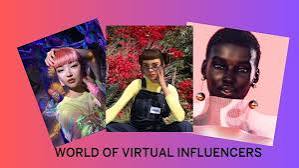The Rise of AI Influencers: How Virtual Celebrities Are Changing Hollywood

In the past decade, the entertainment industry has undergone significant transformations, largely driven by advances in technology. One of the most revolutionary trends to emerge in Hollywood is the rise of AI influencers and virtual celebrities—computer-generated figures that are captivating audiences and influencing the way we consume media. With the growing capabilities of artificial intelligence (AI), these digital personas are no longer confined to the realm of video games and virtual worlds; they are now taking center stage in the entertainment industry, becoming a key part of marketing campaigns, social media influence, and even acting.
The emergence of virtual celebrities is not just a novelty; it represents a fundamental shift in how Hollywood operates and how audiences interact with entertainment. But what exactly does this mean for the future of fame, celebrity culture, and the entertainment industry as a whole?
The Rise of AI Influencers
What Are AI Influencers?
AI influencers are digital avatars or characters powered by artificial intelligence that are designed to simulate real human behavior. These virtual beings are often designed to look like real people but can be entirely computer-generated, blending art, technology, and human creativity. Their purpose is to interact with audiences, share content on social media, endorse products, and even appear in films or TV shows—all without a human behind the scenes.
In many ways, AI influencers are taking over the role of traditional social media influencers. They post photos, share lifestyle content, and create brand partnerships, all while interacting with fans in ways that feel authentic. The biggest difference? They aren’t real people—they are powered by algorithms, rendering them both completely controlled by their creators and yet eerily lifelike in their interactions.
Popular AI Influencers in Hollywood
- Lil Miquela
One of the most well-known virtual influencers, Lil Miquela was created in 2016 by the digital studio Brud. Since then, she has amassed millions of followers on social media platforms like Instagram, where she posts fashion-forward content and promotes brands. Miquela’s ability to collaborate with major brands like Prada, Calvin Klein, and Balenciaga has catapulted her into the limelight, making her one of the most successful virtual influencers in Hollywood. - Shudu Gram
Created by photographer Cameron-James Wilson, Shudu Gram is the world’s first digital supermodel. With her photorealistic features, Shudu’s presence has helped challenge the fashion industry’s conventional standards of beauty and diversity. She has worked with high-end brands such as Fenty Beauty and Balmain, solidifying her place in both the virtual and real-world fashion industries. - Imma
Imma, a virtual influencer created in Japan, is another example of how AI avatars are making waves in fashion and entertainment. With her vibrant pink hair and stylish look, she has gained a strong following and become a face of major campaigns with companies like Mercedes-Benz and Chanel. Imma’s rise highlights the appeal of virtual influencers not just in the West, but also in global markets like Asia, where virtual idols have long been popular.
These AI influencers are more than just pretty faces; they are now integrated into the entertainment ecosystem, collaborating with major brands, attending virtual events, and even starring in music videos. But how did these virtual influencers rise to prominence, and what does their popularity say about the future of celebrity culture?
AI Actors in Hollywood: The Digital Transformation of Film and TV
AI in Acting: The Virtual Actors Taking Over
While AI influencers have found success in social media and fashion, AI-generated actors are beginning to infiltrate the world of film and television. These virtual actors are created using advanced motion-capture technology, CGI, and AI algorithms that enable them to express emotions, deliver lines, and perform stunts—all while being entirely computer-generated. Unlike traditional actors, AI actors are not limited by physical constraints or time, making them a powerful tool for filmmakers.
AI Actors on the Big Screen
- The use of AI in movies like The Irishman and Avatar 2
In films like Martin Scorsese’s The Irishman and James Cameron’s Avatar 2, filmmakers have already embraced advanced CGI technology to digitally de-age actors and create entire virtual worlds. While these actors are not entirely AI-generated, the technology used in these films has paved the way for the creation of fully virtual actors in the future. - The ‘Deepfake’ Controversy and Opportunities
While deepfake technology—which uses AI to manipulate video footage—has raised ethical concerns regarding the misuse of celebrity likenesses, it has also opened the door for a new form of virtual acting. AI-generated versions of deceased actors (such as the recreation of Carrie Fisher’s Princess Leia in Rogue One) could become more common, as filmmakers explore the possibilities of bringing iconic characters back to life or creating entirely new ones that are driven by AI. - Virtual Casts in Animated Films
In animated films and video games, the use of AI to generate characters who appear more human-like is becoming increasingly sophisticated. The next generation of digital actors will not just rely on traditional animation but will integrate AI to create characters that behave, move, and interact with their environment just like real humans. Films like Disney’s Frozen II and Pixar’s Soul are taking steps in this direction by pushing the boundaries of AI in animation.
How AI Celebrities Are Changing Hollywood
AI Celebrities in Music and Advertising
The influence of AI extends beyond just social media and film—virtual celebrities are also changing the face of advertising and the music industry. Many brands are now partnering with AI influencers to create highly targeted marketing campaigns, with Lil Miquela even releasing her own music. This integration of AI avatars into the music industry allows artists to create virtual personas who can perform live concerts, release albums, and interact with fans without the physical limitations of a human artist.
In advertising, AI influencers and celebrities offer brands a controlled, risk-free alternative to human endorsements. Since virtual celebrities can be programmed to behave in specific ways, they provide companies with a consistent and predictable image. This has led to an explosion in brand collaborations with AI characters, from fashion brands to technology companies, and even luxury goods.
The Appeal of AI Celebrities
There are several reasons why AI influencers and virtual celebrities are gaining traction in Hollywood:
- No Human Constraints: AI characters are free from the constraints that come with human actors—such as aging, illness, and scandal—making them more appealing to brands and creators who want consistent personas.
- Diverse Representation: AI influencers can be created with features and backgrounds that cater to a diverse audience, representing a wide range of cultures, ethnicities, and gender identities. This inclusivity makes them more relatable to global audiences.
- Innovative Marketing: AI-generated celebrities are highly adaptable and can be used in highly creative marketing campaigns. These digital personas are frequently seen endorsing brands or collaborating with influencers, making them the perfect tools for engaging younger audiences on social media.
The Ethical and Social Implications of Virtual Celebrities
While the rise of AI influencers and virtual celebrities is undoubtedly exciting, it comes with a set of ethical and social challenges. One of the main concerns is authenticity—since AI characters can be programmed to say and do anything, there is a risk that they may lack the genuine connection that audiences often crave from human celebrities. Moreover, the rise of virtual celebrities raises questions about the future of human labor in entertainment, as traditional actors and influencers may be replaced by AI.
Other ethical concerns revolve around issues such as privacy, deepfake misuse, and the potential for AI to perpetuate unrealistic beauty standards. As AI celebrities become more common, the entertainment industry will need to address these concerns in order to maintain a healthy and sustainable ecosystem.
The Future of AI Influencers and Virtual Celebrities
As AI technology continues to evolve, the influence of virtual celebrities is expected to grow exponentially. In the coming years, we may see entire films, TV series, and music albums starring AI-generated actors and influencers. Additionally, with the rise of virtual reality (VR) and augmented reality (AR), audiences may soon be able to interact with their favorite AI characters in entirely new and immersive ways.
The line between fiction and reality will continue to blur, and AI influencers will play an increasingly central role in shaping the future of entertainment. As we look ahead, it’s clear that artificial intelligence will not only change how we create and consume entertainment—it will redefine the very concept of celebrity itself.
In this new era, AI influencers and virtual celebrities are no longer just digital novelties—they are shaping the future of Hollywood and beyond.



